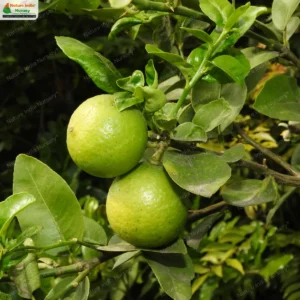Citrus aurantiifolia, commonly known as Key Lime, is a small, citrus tree native to Southeast Asia but widely cultivated in tropical and subtropical regions. The tree typically reaches a height of about 1-2 meters and produces small, round limes that are green when immature and turn yellow when ripe. Key limes are known for their intense, tart flavor and high acidity, making them a popular choice for culinary uses, especially in desserts like Key Lime Pie.
Habitat
This species thrives in warm, sunny environments with well-drained soil. It prefers areas with moderate rainfall and can be found in tropical and subtropical climates, often grown in gardens and orchards.
Planting and Care
- Light: Full sun is essential for healthy growth.
- Soil: Well-draining soil is crucial; sandy or loamy soil is preferred.
- Watering: Regular watering is needed, particularly during dry spells, but avoid overwatering.
- Maintenance: Prune to maintain shape and encourage fruit production; fertilization may be necessary during the growing season.
Additional Information
- The fruit is rich in vitamin C and is often used in beverages and cooking.
- Key Limes are sensitive to cold and should be protected from frost.
- They are often grown in pots, making them suitable for small spaces.
Please note: Key Limes may attract pests like aphids and spider mites, so regular monitoring is recommended.













